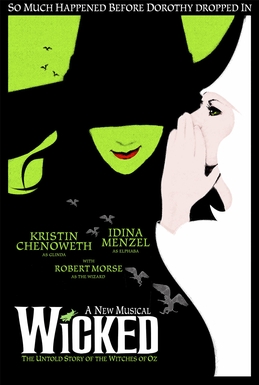My wife and I have been married nearly two and half years. October 18th is the day that we remember the covenant we made and celebrate it. My wife, being a big fan of theatre "happened" to observe and "hint" that the musical Wicked was showing in Denver near our anniversary. My parents were going to be in town around then and my mom loves the theatre too. Their anniversary was coming soon so we decided to make it a double date. To prepare me for the show the CD was purchased and listened to often.
Watching the show that evening I have to say, I really enjoyed it! I thought the story, the music, and the acting was amazing. I was completely engaged by the tale of Elphaba and Gilinda, I liked the spin, and the alternative perspective to the traditional Wizard of OZ story. To be honest after the show I could not stop thinking about it and unashamedly singing the songs. Now I am a little more cautious.
As I thought about the original story of the Wizard of OZ (the movie that is) and processed through the liberties Wicked, which is based on the book Wicked by Gergory Maguire, took the original idea, it seemed vary plausible. What if the Wicked Witch of the West was not wicked as the the original story intended, but actually just misunderstood as the musical suggests. Makes for a great story, but I think taking these liberties, is not without consequence. I think it is a great example in pop-culture of Deconstructionism. Deconstructionism, in very basic terms is that thought that there is no one way of applying interpretation or criticism to a text, interpretation is up to the reader. This school of thought was made famous by French philosopher Jacques Derrida. Wicked I would contend, is a deconstruction of The Wizard of Oz. The original author (L. Frank Baum) intended the Wicked Witch of the West to be just as her names describes her, wicked, not misunderstood. This is not me discrediting the musical Wicked, as I said I enjoyed it and still do. It is a production that is exceptionally well done in all areas. I am simply pointing out deconstructionism within pop-culture.
The problem deconstructionism presents is to the way people interpret the Bible and/or other sources of literature. If deconstructionism is true, then meaning in literature is relative to the person reading, not the authors intent. Even this post's interpretation is up to you, the reader. Many in our culture, Christians alike, apply this deconstructionist thought to the study of literature. I want to focus on the the dangers of deconstructionism in studying scripture. In many bible studies a question that is often asked is "What does this mean to you?" With the response "Oh, I never thought of that, good insight, to me it means..." It seems in many ways, deconstructionism has made its way into the church. Meaning is interpreted by the reader, not the text's actual meaning. This can be very dangerous because we can misapply texts thinking they are Biblical truth, and then live our lives in a way that could be opposite of God's intending meaning. We tend to forget the more important questions "What does this text mean?" or "What is/was the authors intent?" We do not look at historical context, author, date, preceding text's context, genre, other theologians, and other important hermeneutical principles. I would contend there is one meaning to a particular text, whether we know what the meaning is, is where the conversations/debates happen. Though Wicked is entertaining, I think it is a good example of deconstructionism within pop-culture and how ideas can effect our view of literature and more importantly Scripture.

No comments:
Post a Comment